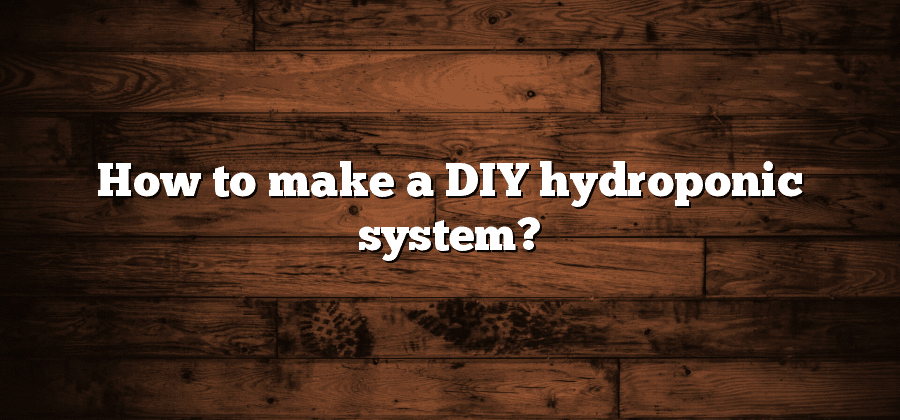Advantages of Hydroponic Systems
There are numerous advantages associated with hydroponic systems, making them a popular choice for modern agriculture. Firstly, one of the key benefits is the significant reduction in water usage compared to traditional soil-based gardening. Hydroponic systems utilize a recirculating system, allowing for water to be continuously reused, resulting in water savings of up to 90%. This not only conserves this precious resource but also reduces the overall environmental impact of agriculture. Additionally, the controlled environment of hydroponic systems enables plants to efficiently absorb nutrients, leading to accelerated growth. With optimal nutrient levels readily available to plants, they can focus their energy on developing robust root systems and flourishing foliage.
Another advantage of hydroponic systems is the elimination of weeds, pests, and diseases commonly associated with soil-based gardening. By removing the need for soil, hydroponic systems effectively eliminate the habitat for these unwanted intruders. The absence of soil also minimizes the risk of soilborne diseases, allowing for healthier plants and higher crop yields. Furthermore, the controlled environment of hydroponics makes it easier to monitor and manage plant growth factors such as temperature, lighting, and pH levels. This precise control ensures optimal conditions for plant growth, resulting in consistent crop quality and increased productivity.
Required Materials for Hydroponic System
To successfully set up a hydroponic system, there are several essential materials you will need. Firstly, you will require a reservoir or a container to hold the nutrient solution. This container should be sturdy, leak-proof, and large enough to accommodate the desired number of plants. Additionally, an air pump and air stones are necessary to ensure the proper oxygenation of the nutrient solution. This helps to avoid stagnant water and promotes healthier root growth.
Another crucial component is a reliable lighting system, as hydroponic plants rely on artificial light for photosynthesis. LED grow lights are popular choices due to their energy efficiency and adjustable spectrum options. It is important to match the lighting system to the size of your hydroponic setup and the specific needs of the plants you plan to grow. Additionally, adjustable hangers or supports for the lights will allow you to position them at the optimal height above the plants.
Choosing the Right Container for Hydroponic System
Hydroponic systems are gaining popularity among indoor gardeners due to their numerous advantages. One crucial aspect to consider when setting up a hydroponic system is choosing the right container. The container plays a vital role in providing stability, support, and optimal growing conditions for your plants.
When selecting a container for your hydroponic system, it’s essential to consider the size and depth needed for your plants to thrive. The container should be spacious enough to accommodate the growth of the root system while allowing the plants to receive sufficient oxygen. Additionally, ensure that the material of the container is non-toxic, food-safe, and will not degrade over time, affecting the nutrient solution or the overall integrity of the system.
Another factor to consider is the shape of the container. Depending on the available space and the type of hydroponic system you are implementing, you may choose from a variety of shapes, including deep square containers, rectangular troughs, or vertical columns. Consider the specific needs of your plants and the available space when deciding on the container shape.
Lastly, the container should have proper drainage to prevent waterlogging and root rot. A container with drainage holes or a built-in drainage system will allow excess water to flow out, maintaining the ideal moisture level for healthy plant growth.
Choosing the right container for your hydroponic system requires careful consideration of size, shape, material, and drainage. By selecting a container that meets these criteria, you can create an optimal environment for your plants to thrive and maximize the benefits of your hydroponic system.
Selecting the Ideal Growing Medium for Hydroponic System
When it comes to setting up a hydroponic system, selecting the ideal growing medium is crucial for ensuring the success of your crop. The growing medium serves as a substitute for soil, providing support and anchorage for the plants’ roots. It also plays a vital role in retaining water and allowing oxygen to reach the roots. There are several options available for hydroponic growing mediums, each with its own advantages and considerations to take into account.
One popular choice for hydroponic systems is Rockwool, a lightweight and sterile medium made from spun mineral fibers. Rockwool offers excellent water retention while still allowing for adequate drainage. Its porous structure allows the roots to access oxygen easily, promoting healthy growth. Another option is perlite, which is a volcanic glass that has been heated and expanded. Perlite is lightweight and provides good drainage, but it does not retain water as well as other mediums. Coconut coir is also commonly used due to its ability to retain moisture and provide good aeration for the roots. It is a sustainable and renewable medium, making it an eco-friendly choice for hydroponic growers.
Determining the Best Nutrient Solution for Hydroponic System
If you are considering setting up a hydroponic system, one crucial aspect to consider is the nutrient solution. The nutrient solution serves as the primary source of essential minerals and nutrients for your plants. Therefore, choosing the right nutrient solution is vital for the healthy growth and development of your hydroponic plants.
When determining the best nutrient solution for your hydroponic system, it is important to consider the specific needs of your plants. Different plants require different nutrients in varying quantities. Conducting thorough research on the nutritional requirements of your chosen plant species will help you select a nutrient solution that meets their specific needs. Additionally, considering the growth stage of your plants is crucial, as nutrient requirements may differ during different stages, such as vegetative growth or flowering. By tailoring the nutrient solution to the specific needs of your plants, you can enhance their overall health and productivity in your hydroponic system.






